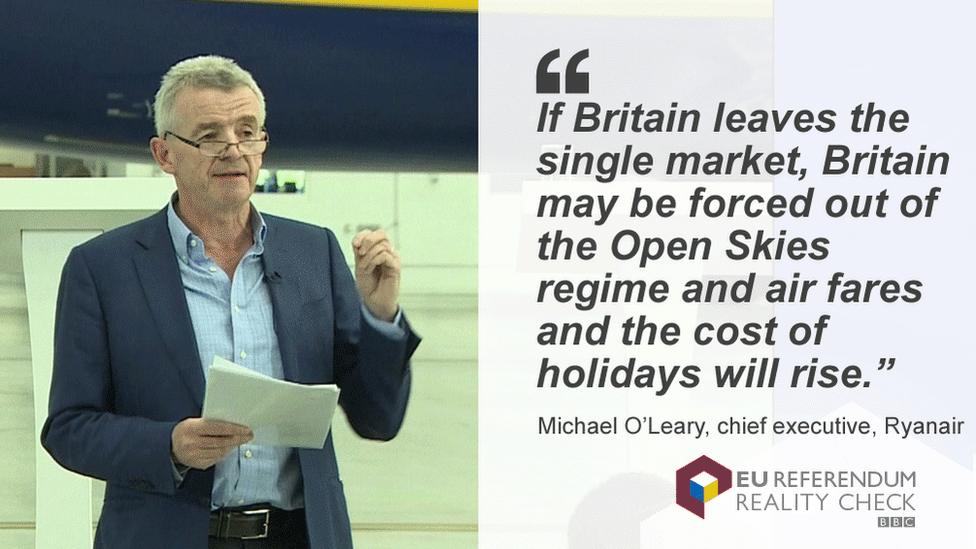Reality Check: Would leaving the EU raise air fares?
- Published

The claim: Leaving the European Union would lead to an increase in air fares.
Reality Check verdict: The UK leaving the EU could lead to an increase in fares. The impact could be reduced or even avoided depending on what agreements the UK reached with the EU and other countries.
Ryanair boss Michael O'Leary said on Monday that Britain leaving the single market may lead to it being "forced out of the Open Skies regime", which would mean the price of flights would rise.
This sounds like a different opinion from February, when he said, external leaving the EU was unlikely to push up air fares.
You can see why he might be uncertain, because the answer depends largely on what happens in negotiations following a UK exit from the EU.
The EU created the legal framework for a single market for aviation in 1992.
Until then, the industry was dominated by national carriers and state-owned airports.
The new single market for aviation allowed any EU airline to operate from and between any country of the EU.
This led to the emergence of many airlines, including low-cost carriers, and increased competition, pushing fares down.
It meant, for example, that an Irish airline such as Ryanair could operate flights from London to Rome, when previously it could only operate flights that originated in or were destined for Ireland.
Air fares have fallen by about 40% since the EU created the single market, although it is worth bearing in mind that it is not only Europe that has low-cost airlines.
Market access
Several countries that are not EU-members are part of the European Common Aviation Area (ECAA), which grants access to the EU single market for aviation in return for compliance with safety requirements and economic cooperation with the EU.
The Western Balkans, Georgia, Israel, Jordan, Moldova and Morocco all have such arrangements, but the UK would not necessarily be granted such status - it would certainly not be automatic.
Also, there is a question of whether it would allow UK airlines such as Easyjet to fly from one airport elsewhere in the EU to another without setting up an EU-based subsidiary.
Similarly, an airline based elsewhere in the EU would not be able to fly freely from one UK airport to another.
Alternatively, the UK could try to reach a bilateral aviation agreement with the EU, which could take any form both sides were prepared to agree on.
Mr O'Leary specifically referred to the UK being "forced out" of the Open Skies regime, which is the aviation agreement between the EU and the US.
That agreement removed restrictions over which airlines were allowed to fly transatlantic routes as well as allowing US airlines to fly between EU airports (as long as the flight starts or finishes in the US) and allowing EU airlines to fly from the US to non-EU countries.
Norway and Iceland, which are not EU members, are nonetheless part of the Open Skies agreement, so the UK might go down that path or negotiate a new bilateral agreement with the US.
But it is possible the UK would not be able to negotiate access to any other markets, which would mean reduced competition and presumably increased prices.
Another factor for airlines would be the potential problems caused if the pound weakened following a Brexit, as various economists have predicted.
Oil is generally priced in dollars, so a weaker pound would be bad news for UK airlines, possibly making them raise fares.
Also, a weaker pound would make flights with foreign airlines more expensive for UK passengers.



- Published22 February 2016
